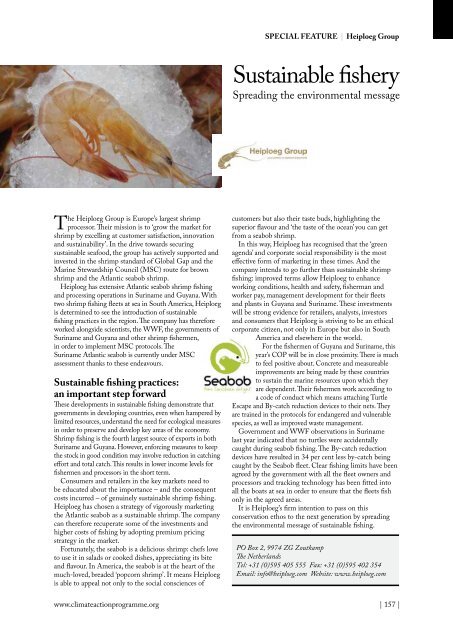Climate Action 2010-2011
Create successful ePaper yourself
Turn your PDF publications into a flip-book with our unique Google optimized e-Paper software.
SPECIAL FEATURE | Heiploeg Group<br />
Sustainable fishery<br />
Spreading the environmental message<br />
The Heiploeg Group is Europe’s largest shrimp<br />
processor. Their mission is to ‘grow the market for<br />
shrimp by excelling at customer satisfaction, innovation<br />
and sustainability’. In the drive towards securing<br />
sustainable seafood, the group has actively supported and<br />
invested in the shrimp standard of Global Gap and the<br />
Marine Stewardship Council (MSC) route for brown<br />
shrimp and the Atlantic seabob shrimp.<br />
Heiploeg has extensive Atlantic seabob shrimp fishing<br />
and processing operations in Suriname and Guyana. With<br />
two shrimp fishing fleets at sea in South America, Heiploeg<br />
is determined to see the introduction of sustainable<br />
fishing practices in the region. The company has therefore<br />
worked alongside scientists, the WWF, the governments of<br />
Suriname and Guyana and other shrimp fishermen,<br />
in order to implement MSC protocols. The<br />
Suriname Atlantic seabob is currently under MSC<br />
assessment thanks to these endeavours.<br />
Sustainable fishing practices:<br />
an important step forward<br />
These developments in sustainable fishing demonstrate that<br />
governments in developing countries, even when hampered by<br />
limited resources, understand the need for ecological measures<br />
in order to preserve and develop key areas of the economy.<br />
Shrimp fishing is the fourth largest source of exports in both<br />
Suriname and Guyana. However, enforcing measures to keep<br />
the stock in good condition may involve reduction in catching<br />
effort and total catch. This results in lower income levels for<br />
fishermen and processors in the short term.<br />
Consumers and retailers in the key markets need to<br />
be educated about the importance – and the consequent<br />
costs incurred – of genuinely sustainable shrimp fishing.<br />
Heiploeg has chosen a strategy of vigorously marketing<br />
the Atlantic seabob as a sustainable shrimp. The company<br />
can therefore recuperate some of the investments and<br />
higher costs of fishing by adopting premium pricing<br />
strategy in the market.<br />
Fortunately, the seabob is a delicious shrimp: chefs love<br />
to use it in salads or cooked dishes, appreciating its bite<br />
and flavour. In America, the seabob is at the heart of the<br />
much-loved, breaded ‘popcorn shrimp’. It means Heiploeg<br />
is able to appeal not only to the social consciences of<br />
customers but also their taste buds, highlighting the<br />
superior flavour and ‘the taste of the ocean’ you can get<br />
from a seabob shrimp.<br />
In this way, Heiploeg has recognised that the ‘green<br />
agenda’ and corporate social responsibility is the most<br />
effective form of marketing in these times. And the<br />
company intends to go further than sustainable shrimp<br />
fishing: improved terms allow Heiploeg to enhance<br />
working conditions, health and safety, fisherman and<br />
worker pay, management development for their fleets<br />
and plants in Guyana and Suriname. These investments<br />
will be strong evidence for retailers, analysts, investors<br />
and consumers that Heiploeg is striving to be an ethical<br />
corporate citizen, not only in Europe but also in South<br />
America and elsewhere in the world.<br />
For the fishermen of Guyana and Suriname, this<br />
year’s COP will be in close proximity. There is much<br />
to feel positive about. Concrete and measureable<br />
improvements are being made by these countries<br />
to sustain the marine resources upon which they<br />
are dependent. Their fishermen work according to<br />
a code of conduct which means attaching Turtle<br />
Escape and By-catch reduction devices to their nets. They<br />
are trained in the protocols for endangered and vulnerable<br />
species, as well as improved waste management.<br />
Government and WWF observations in Suriname<br />
last year indicated that no turtles were accidentally<br />
caught during seabob fishing. The By-catch reduction<br />
devices have resulted in 34 per cent less by-catch being<br />
caught by the Seabob fleet. Clear fishing limits have been<br />
agreed by the government with all the fleet owners and<br />
processors and tracking technology has been fitted into<br />
all the boats at sea in order to ensure that the fleets fish<br />
only in the agreed areas.<br />
It is Heiploeg’s firm intention to pass on this<br />
conservation ethos to the next generation by spreading<br />
the environmental message of sustainable fishing.<br />
PO Box 2, 9974 ZG Zoutkamp<br />
The Netherlands<br />
Tel: +31 (0)595 405 555 Fax: +31 (0)595 402 354<br />
Email: info@heiploeg.com Website: www.heiploeg.com<br />
www.climateactionprogramme.org | 157 |












